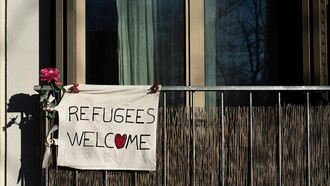The concept of Europe stands at a crossroads, caught between its self-proclaimed role as a beacon of human rights and the harsh realities of its border policies. This article delves into the heart of this contradiction, examining Europe's migration stance, its fluid geopolitical identity, and the practice of (in)hospitality against the backdrop of its historical legacy. As we navigate the complexities of the French referendum's aftermath and the fervour of the European soccer championship, we must ask: What does Europe truly stand for?
Defining Europe: borders, identity, and the elasticity of geopolitical space
The contradiction between Europe's self-image as a defender of human rights and the reality of its border policies is mirrored in the way we define Europe itself. The very concept of Europe is bound to the idea of borders—lines that separate “inside” from “outside.” Yet, these borders are not fixed; they are elastic, shifting in response to the movement of goods, people, ideas, and technologies. This fluidity makes it difficult to pinpoint what Europe is, as its geopolitical boundaries are constantly being redrawn.
In general, it can be posited that the capacity to relate to a concept is contingent upon the imagination of its occurrence. However, the inception of such an imagination is predicated on the establishment of boundaries to delineate the extent of its potentiality and the scope of its manifestation. The delineation of these boundaries is contingent upon the determination of what is considered to be within and without the confines of the conceptual entity. Consequently, the delineation of what is regarded as "inside" necessitates the exclusion of "outside" and vice versa.
Therefore, it is commonly asserted that the definition of Europe is inextricably linked to the delineation of its borders. However, this assertion is problematic when one considers the possibility that these borders are mobile and cannot be categorized into a precise location. Indeed, if the precise delineation of Europe's geopolitical delimitations is a challenging venture, it is because its borders are elastic and mobile, rendering it impossible to pinpoint a fixed geographical location for them. Given the malleability of Europe's delimitations and the ongoing evolution of these demarcations in response to the movement of goods, persons, ideas, and technologies, defining what Europe actually is represents a significant challenge. However, this fluidity not only complicates the definition of Europe but also has profound implications for those who navigate its borders.
The moral quandary of Europe's border policies
The use of borders to differentiate between individuals within and outside of these demarcations raises questions about the implications of such a system for the concept of Europe. When discussing the borders of Europe and the processes through which individuals and resources traverse them, it is important to consider the ways in which these processes are perceived in the context of the contemporary globalized economy. While the transgression of borders is often regarded as relatively straightforward with regard to tangible commodities and technological resources, the movement of specific individuals and, to some extent, even ideas is regarded as considerably more challenging.
What consequences arise from the filtering quality of borders with regard to the values of Europe? Is the value of free movement within its territory challenged? Is the value of equality between individuals disqualified? What are the reasons why migration is considered a challenge for Europe? How has Europe found itself in a situation where there is a tension between universal values of liberalism, including freedom of movement and the moral equality of all human beings, and the discretionary authority of the European ruler regarding policies of admission, filtering and rejection?
Within the European context, the violence inherent in border practices and the human suffering they produce are often justified by a cognitive system that presents them as if they were the consequence of a purely technical and neutral process that is completely detached from any political considerations and therefore absolute and unquestionable. The depoliticization of the European space has the effect of lowering the moral weight of political choices.
This process results in systematic dehumanization of people who move across borders, who are reduced to abstract categories detached from historical context, and deprived of their individual will. By ascribing to individuals on the move a passive role as objects to be assisted or relocated, the discursive construction of European borders reproduces and reinforces the constitutive hierarchy of the world for the benefit of Europeans, with the intention of concealing the fact that, in the current context, the individual choice of migrants and migrants to move, through the political force of their bodies and lives on the move, is shaking, reconfiguring, and questioning the organization of spaces, Europe, and the world.
Double absence: the dehumanizing dichotomy in Europe's migration discourse
This dehumanization has far-reaching implications. In the geopolitical and accompanying narrative, the migrants are "doubtfully absent," constantly "out of place." While freedom of movement is widely recognized in Europe among Europeans, it is not universally granted to all. In fact, migrants are often prevented from leaving their place of origin and attempting to settle elsewhere. The European power to classify, divide, and fragment populations through the creation of a hierarchy of rights and freedoms continues to be exercised in the context of global mobility. The dichotomy between "legitimate" and "illegitimate" migrants, upon which the global mobility system is based, perpetuates the existing inequalities and naturalises the asymmetry with respect to the varying degrees of mobility and immobility accorded to human beings across the globe.
In the European context, which is perceived as a bastion of rights, the introduction of increasingly restrictive immigration policies has effectively consolidated a rigidly classist approach to mobility, whereby differential degrees of freedom of movement and immobility are granted on the basis of citizenship, class, or income. In managing the common space, Europe has reproduced the exclusivist model characteristic of ethnic and cultural nationalism on a larger scale. This has resulted in an inadvertent reinforcement of the very tendencies that, in principle, the European integration project sought to overcome. The formal recognition of the equal dignity of all human beings cannot be accompanied by discriminatory policies, practices, and discourses that undermine the fundamental tenets of the European Union. Such actions would ultimately jeopardize the very existence of the European Union.
In light of the above considerations, one must ask what kind of ideology or values Europe represents today. This is a question of particular importance, both for those who migrate in contestation of the current state of Fortress Europe, for those who support the betrayed promises of European integration, and for those who challenge the very idea of an entity superior to nation-states in the name of national sovereignty.
The debate can be broadly described as one that concerns questions whose origins can be traced back to a considerable period of time, but which the transformations brought about by the intensification of globalization have helped to make increasingly urgent. The questions are those concerning the right of states to decide whom to admit into their territory. If such a right exists, is it morally acceptable in any case and under any conditions? What is the relationship between such a right and the liberal recognition of the equal dignity of every human being? To what extent and with what degrees of freedom can human beings legitimately exercise their right to choose where to be?
Europe's asylum conundrum: bureaucracy, rights, and the human cost
The complex European bureaucratic-managerial approach to managing human displacement has proven challenging. The difficulty of systemizing a functional mechanism of relocation between countries that considers the needs of each individual person, has further complicated the situation. The systematic impossibility for people who enter Europe and apply for asylum to be able to choose where to stay has led to the emergence of some countries and refugee centers as points of enforced immobility. The violations of the human rights of people on the move today are connected with the European Union's attempt to maintain a common European space "cleansed" of unwanted humanity. These actions demonstrate the European Union's enormous hypocrisy, which proclaims itself to be the homeland and main promoter of human rights in the world and simultaneously implements border policies and practices that have been linked to the deaths and systemic suffering of large numbers of people.
The refugee protection system results in an asymmetric allocation of the right to mobility to the negative, whereby a greater level of suffering corresponds to a greater recognition of the right to change place of residence. Additionally, it presumes that individuals granted protection relinquish their right to choose where to reside. Indeed, the system of placement and relocation among European states of refugees and asylum seekers necessitates that those who are protected relinquish their right to choose in exchange for protection.
Consequently, refugees are expected to relinquish their aspirations, desires, and hopes, as well as the possibility of relocating to areas where the construction of a dignified life may be more accessible, due to factors such as linguistic, economic, and social circumstances, the existence of a larger diaspora, or the presence of a more robust support system. Ultimately, the decision regarding where to relocate rests with the receiving countries, which expect that refugees will be content with the level of protection afforded them, wherever that may be, even if it entails accepting conditions that would not be acceptable to the local population.
Revisiting hospitality: Europe's foundational values in the face of migration
Amidst the bureaucratic complexities and the human rights concerns outlined above, the practice of hospitality emerges as a crucial aspect of the refugee experience, one that calls for a reevaluation of Europe's commitment to its foundational values.
The concept of hospitality towards migrants is inextricably linked to European heritage. It is a reflection of the continent's history of intercultural encounters and its ongoing commitment to human rights and dignity. As Europe continues to navigate the complexities of migration, the principles of hospitality remain a cornerstone of its heritage and a guide for the future. Moreover, migration has led to a re-evaluation of the concept of a post-migrant Europe, as the experiences of migrants have become a significant factor in shaping the social fabric of entire societies. In considering the European heritage not as a uniquely European legacy, but as constituted by myriad encounters with the rest of the world, it becomes evident that the EU messages of tolerance, diversity, and democracy are not the primary drivers of change. Rather, the European heritage itself is an inherently political concept that amplifies and interferes with social cohesion.
Conclusion
Charting the future: hospitality, heritage, and the post-migrant European identity
The considerations above are based on the premise that the nation-state and supranational entities such as the European Union cannot be assumed to be containers of heritage formations. In this context, heritage can be used as a tool for discursively delineating boundaries of inclusion and exclusion, in addition to the practice of hospitality, which is contingent upon crossing a threshold between inside and outside. It is also a fruitful starting point for challenging the way in which Europe and EU institutions have conceived migration as a crisis and migrants as a threat to the welfare order and economic stability of European societies, rather than considering migration as a structural and socio-economic phenomenon. Therefore, hospitality practices towards migrants promote an open and equal dialogue between newcomers and host societies. In this light, processes of hospitality are themselves a form of cultural heritage, as they contribute to enriching the cultural fabric of the diverse and hybrid entity that is Europe.















